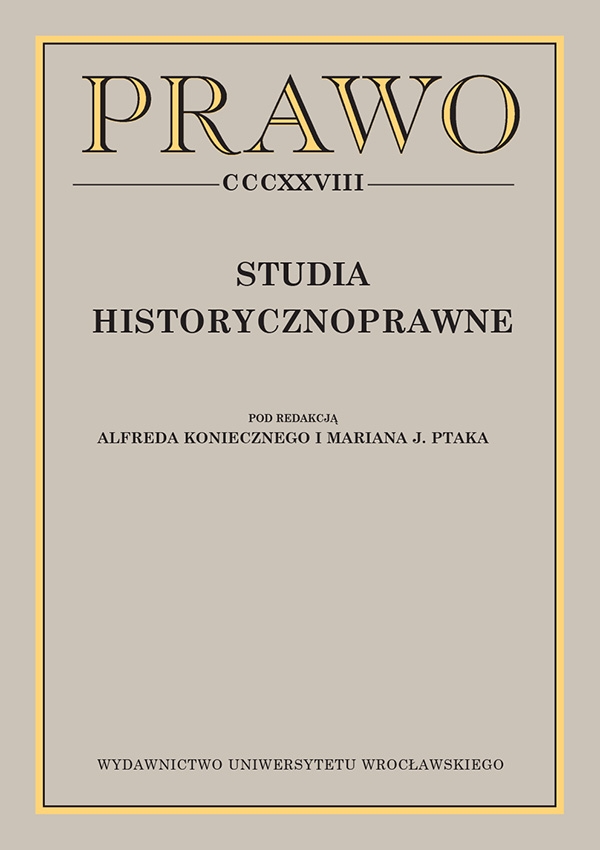

Articles

Remarks on the problems associated with the inculturation of the Napoleonic Code in the Kingdom of Poland — doubts concerning Article 530
A serious problem can arise when a society has to deal with regulations not adapted to its internal relations, regulations that have been imposed on that society. Such a situation occurred in Poland in the early nineteenth century in connection with the introduction of the Napoleonic Code within the territory of the Duchy of Warsaw. This generated a lot of controversy, not only among members of the Council of State, but also among wealthy and lesser nobility as well as Catholic clergy. The state was characterised by numerous remnants of feudalism. The conditions, when it came to both social and economic relations, were different than those in France. Consequently, the provisions of the Code referring to property were not fully applicable in practice.
After the fall of the Duchy of Warsaw the Napoleonic Code remained in force in the Kingdom of Poland and the Free City of Kraków. However, it still had many opponents in the Kingdom of Poland. In the end there emerged a concept of reform of property law, with one of its points being a change in the provisions guaranteeing inferior owners a possibility of redeeming their obligations. Such a right was guaranteed by Article 530 of the Code, which could lead to dominium utile or inferior ownership being transformed into dominium plenum or full ownership. A draft amendment was prepared by the Legislative Deputation and then adopted by the parliament on 13 June 1825.
The inculturation of the Code in the Kingdom of Poland, a country on a lower level of socio-economic development than France, was doomed to failure. While in the Duchy of Warsaw the Napoleonic Code was fictitiously used in practice, as it were, in the Kingdom of Poland legislative work was undertaken to change civil law and adapt it to the conditions in the country.
Bemerkungen zu den Problemen der Inkulturation des Code Napoléon im Königreich Polen — Fragen vor dem Hintergrund des Art. 530
Das Aufzwingen der Gesellschaft der Vorschriften, die den dort herrschenden Verhältnissen nicht entsprechen, kann ein wesentliches Problem darstellen. Gerade mit dieser Situation hatte man auf polnischen Gebieten am Anfang des 19. Jahrhunderts im Zusammenhang mit der Einführung des Code Napoléon im Warschauer Herzogtum zu tun. Diese Maßnahmen weckten viele Kontroversen nicht nur unter den Mitgliedern des Standesrates, sondern auch des vermögenden und mittleren Adels sowie der katholischen Geistlichkeit. Den Staat charakterisierten zahlreiche feudale Überreste. Es herrschten dort andere als in Frankreich sowohl soziale, wie auch wirtschaftliche Verhältnisse. In der Folge fanden die Vorschriften des Gesetzbuches betreffend das Sachenrecht keine vollständige Anwendung in der Praxis.
Nach dem Fall des Warschauer Herzogtums bewahrte das Code Napoléon die Kraft auf den Gebieten des Königreiches Polen und der Freistadt Krakau. Im Königreich Polen hatte es jedoch weiterhin viele Gegner. Letztendlich klärte sich die Konzeption einer Reform des Vermögensrechtes und ein ihrer Punkte war die Änderung der Vorschriften, die die Möglichkeit des Rückkaufs der Obliegenheiten durch die unterliegenden Eigentümer garantierten. Dieses Recht sicherte Art. 530 des Code Napoléon zu, dessen Geltung zur Umwandlung des unterstellten Eigentums in ein volles Eigentum führen könnte. Der Entwurf der Novellierung wurde von der Rechtsgebenden Deputation vorbereitet und dann durch das Parlament am 13. Juni 1825 beschlossen.
Der Inkulturationsprozess des Gesetzbuches im Königreich Polen, einem Staat, der auf einer niedrigeren Ebene der sozial-wirtschaftlichen Entwicklung als Frankreich stand, war zu einer Niederlage verurteilt. Obwohl im Warschauer Herzogtum eine Fiktion der Anwendung des Code Napoléon in der Praxis angenommen wurde, so unternahm man im Königreich Polen legislatorische Arbeiten mit dem Ziel der Änderung des Zivilrechtes und seiner Anpassung an die im Lande herrschenden Verhältnisse.